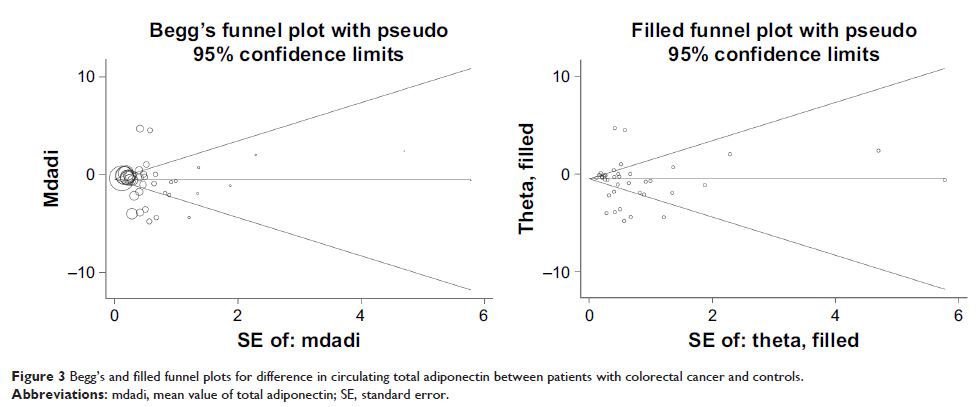108985
论文已发表
注册即可获取德孚的最新动态
IF 收录期刊
- 3.4 Breast Cancer (Dove Med Press)
- 3.2 Clin Epidemiol
- 2.6 Cancer Manag Res
- 2.9 Infect Drug Resist
- 3.7 Clin Interv Aging
- 5.1 Drug Des Dev Ther
- 3.1 Int J Chronic Obstr
- 6.6 Int J Nanomed
- 2.6 Int J Women's Health
- 2.9 Neuropsych Dis Treat
- 2.8 OncoTargets Ther
- 2.0 Patient Prefer Adher
- 2.2 Ther Clin Risk Manag
- 2.5 J Pain Res
- 3.0 Diabet Metab Synd Ob
- 3.2 Psychol Res Behav Ma
- 3.4 Nat Sci Sleep
- 1.8 Pharmgenomics Pers Med
- 2.0 Risk Manag Healthc Policy
- 4.1 J Inflamm Res
- 2.0 Int J Gen Med
- 3.4 J Hepatocell Carcinoma
- 3.0 J Asthma Allergy
- 2.2 Clin Cosmet Investig Dermatol
- 2.4 J Multidiscip Healthc

低循环总脂联素,特别是其非高分子量组分,代表结肠直肠癌的一个有前途的风险因素: 一个荟萃分析
Authors Lu W, Huang Z, Li N, Liu H
Received 16 November 2017
Accepted for publication 10 February 2018
Published 4 May 2018 Volume 2018:11 Pages 2519—2531
DOI https://doi.org/10.2147/OTT.S157255
Checked for plagiarism Yes
Review by Single-blind
Peer reviewers approved by Dr Colin Mak
Peer reviewer comments 2
Editor who approved publication: Prof. Dr. Geoffrey Pietersz
Aim: The principal goal of this meta-analysis is to test the hypothesis
that circulating total adiponectin or certain fractions may represent a
promising biological candidate in modulating the risk of colorectal cancer.
Methods: The processes of paper identification, paper selection and data
extraction were accomplished independently by two authors. Effect-size
estimates were expressed as weighted mean difference (WMD) and 95% confidence
interval (95% CI). A total of 31 papers including 48 qualified studies (7,554
patients with colorectal cancer and 9,798 controls) were meta-analyzed.
Results: Pooling all studies found that circulating total adiponectin was
significantly lower in patients with colorectal cancer than in controls (WMD:
-0.76 µg/mL, 95% CI: -1.20 to -0.32, p =0.001), with
significant heterogeneity (I 2: 94.2%) and low publication bias (Egger’s p =0.336). By adiponectin
fractions, the difference in high-molecular weight (HMW) adiponectin was
comparable between the two groups (WMD: -0.22 μg/mL, 95% CI: -0.70 to
0.25, p =0.350), while non-HMW
adiponectin was significantly lower in patients with colorectal cancer than in
controls (WMD: -0.27 µg/mL, 95% CI: -0.35 to -0.19, p <0.001), with marginal
heterogeneity (I 2: 52.3%). Subgroup analysis revealed that effect-size estimates were
heterogeneous when grouping studies by cancer subtype, region, study design,
matching status, gender and obesity. Further meta-regression analysis indicated
that age and gender were significant potential sources of heterogeneity. The
results showed the studied subgroups were not subject to publication bias
(Egger’s p <0.1).
Conclusion: Our data collectively indicate that low circulating total
adiponectin, especially its non-HMW fraction, represents a promising risk
factor for colorectal cancer. Further studies are needed to explore underlying
mechanisms.
Keywords: colorectal cancer, total adiponectin, high-molecular weight
adiponectin, non-high-molecular weight adiponectin, risk factor
